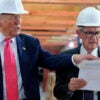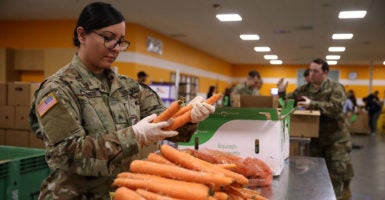Already, the COVID-19 pandemic has caused incalculable damage: death for some, illness for many, and a profound toll in uncertainty, stress, and economic loss for nearly all.
By all accounts, the world is at the beginning of this event, not nearing the end, wrestling with its magnitude and potential long-term consequences. Each day brings more reports of how bad things are and how much worse they could become.
Any rational person has cause to be anxious, fearful, even distraught. But is it all so bleak? Are there no stories that reveal the better angels of our nature or examples that hint of where all this will lead once the pestilence has been defeated?
History is replete with examples of people rising to meet the challenges of trying times, finding ways not only to cope with unexpected dangers but to surmount them and along the way discover more about themselves and their society than they knew before. Our current troubled time is no different.
Even a cursory review of what is going on in the midst of all the reports of bare shelves and mounting hospital admissions gives us much to be thankful for already and ample cause to look forward to inspiring things not too far in our future. Consider the following:
The global scientific community has marshalled all of its resources to find treatments and a vaccine for the COVID-19 disease, an effort unmatched since the world mobilized to end the Spanish influenza pandemic a century ago. This sort of effort leads to new methods and procedures that change how we respond to future health challenges.
Governments and their agencies, medical researchers, manufacturers, and innovators across the technology sector are working together to speed the development of vaccines and test kits. Such collaboration creates reference points and relationships among these communities of lasting value.
Innovative solutions are being found and deployed to bring testing to the people rather than at overloaded and potentially dangerous medical facilities. Drive-thru stations, in-home test kits, and conversion of public and commercial spaces to support medical assessment and treatment are all in the works.
Witness the huge outpouring of support from employers to help their employees and customers affected by the pandemic, mobilizing specialized capabilities and allocating resources to serve the common good in every commercial venture across the country.
Local news outlets and social media sites are sharing stories of neighbors reaching out to neighbors and lending support to their community. Yet more instances of new relationships that not only won’t be forgotten, but will make possible better relationships in the days ahead.
People of every sort have taken to social media to share information, from affordable and practical do-it-yourself recipes for hand sanitizer and managing shelter-in-place supplies to dealing with the boredom and stress that accompany restrictions on travel and social events.
Churches and social support groups are finding different ways to minister to their communities.
We are happily learning of the strategic importance of being energy independent.
We are becoming aware of the strategic risk of being too dependent on single countries, such as China, for critical items such as pharmaceuticals, personal protective equipment, and electronics.
This is already spurring efforts to diversify supplier and production networks that will strengthen our national economy and enable it to better withstand future shocks.
We are rediscovering the life-sustaining virtues of individual resiliency, self-sufficiency, and appreciation for those putting in the hours to ensure bread and milk make it to store shelves and other items reach their destinations.
Perhaps we are rediscovering that it pays to maintain a bit of cushion in our pantries and bank accounts and to “drive on the top half of our tanks” … and not only as it applies to our cars.
Seeing that we can prepare for storms and then weather them leads to confidence in our ability to handle tough times. Those who have been through a crisis know it helps you prepare for the next one and the one after that.
The much-praised Greatest Generation overcame the hardships of World War II and harnessed that grit to achieve unprecedented levels of productivity and creativity in the following decades.
COVID-19 does not present the same type of threat to our way of life as did global war, but given we have experienced a remarkably extended period of peace and prosperity, this public health crisis affecting so many people in so many countries at the same time might serve a similar function.
Extended shutdowns across every sector of our economy are more likely to build demand than extinguish it, resulting in an explosion of growth when the black clouds of virus dissipate, as they will.
Shared adversity breeds the tightest bonds. Combat veterans forge relationships with those with whom they served that typically cannot be matched in regular circumstances. The same is often said of those in law enforcement or among fire fighters.
Periods of extended crisis often lead to a renewal of faith and of a sense of community; for some it leads to the discovery of such. The regular work-a-day world often crowds out time for family or quality time—real quality time—in contemplative pursuits. We do not seek crises to force this, but the pandemic is here, and history shows that beautiful things come from the most trying of circumstances.
Younger generations are often dismissed as self-absorbed and shallow, but this period of pandemic likely will explode that myth for the older generation and prove to the younger it has what it takes to persevere, which in turn will equip it for future challenges.
When life is at stake and comfortable norms are swept aside, pettiness gives way to the important and meaningful things displace minutiae and the various trivialities that distract our awareness and skew our priorities.
It could very well be the case that in the coming weeks and months, this crisis leads many of us to be more thoughtful, more pragmatic, and more tolerant.
It is within our power to determine how we will respond to this event, the type of person we choose to be, how business owners and workers respond, and how officials work with or against each other and whether they work for the American people.
Pandemics are watershed events that can sweep away the debris that clogs our thoughts and desensitizes us to the beauty and potential that surrounds us. We do not wish for them and we pray they never happen, but when they do occur, people find themselves rising to the challenge of dealing with them.
These moments call upon us to measure our character and assess what is important to us. How will you choose to live this moment and the days and weeks and perhaps months to come? Where will this crisis place you as a person when the darkness of pandemic has passed?
I am willing to bet that the vast majority of us will emerge stronger and more confident, wiser than when this crisis began.
We have a long way to go before we reach the end of this road. Until then, see to yourself, see to your family and to your neighbors, and wash your hands!
































